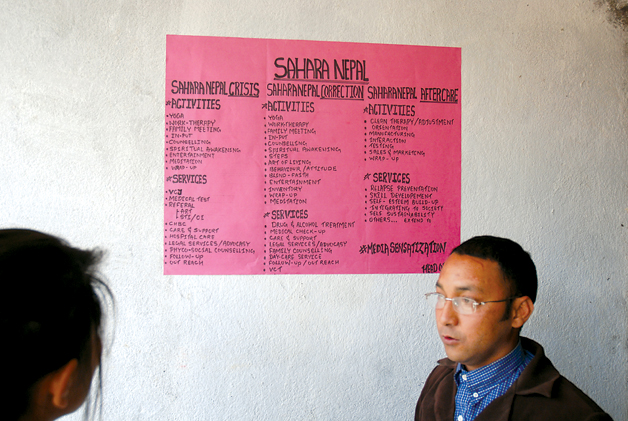
As long as society exists, social norms and stigmas never cease. Categorization of the whats and whys of its extent is what differentiates these social issues. They say ‘development’ of a nation has a lot to do with it. The more aware and educated the people the more progressive a nation, and social stigmas become a lesser concern. In this millennia, when rocket science and nuclear activities determine the fate of earthlings, it is daunting that people still despise one another in values based on narrow social perceptions and biases. Among this falls HIV/AIDS, a disease still synonymous with untouchability, isolation and scorn.
“Most of our society is uneducated and still unaware. HIV/AIDS is a huge taboo, and the ones inflicted are subjected to utter mistreatment,” says Bijay Maharjan, chairperson of Sahara Nepal —Crisis, Care and Correction Center. Located northwest of Sitapaila (west side of the Ring Road) in Kathmandu, the organization lies hidden among other ‘modern’ buildings of the area. Cradled by a hill to the north, the place is secluded, with a few neighboring houses and new construction work in progress. The normalcy is disrupted as one enters the Sahara Nepal office. Inspirational quotes in bold letters adorn the cement grey exterior. Written by felt pen in natural handwriting, the words seem to be intense and meaningful. This is Sahara Nepal at first glimpse.
Sahara Nepal is a community-based NGO focused in five VDC communities working to rehabilitate HIV/AIDS victims and to raise awareness about the disease. The organization also gives counseling and residential treatment on drug abuse. The program was established in July 2008 by a group of seven young adults, who have had their struggles with crisis situations. Sahara Nepal is their initiative to help others battling drug addiction and HIV/AIDS infection.
“The rate at which today’s youngsters are falling prey to drug abuse is astounding. The rate has quadrupled in the past couple of years,” says Akash Shrestha, one of the founding members. “Having stayed clean for a long time now, we want to help others in jeopardy. We know the perils of drug abuse, and our concern is to save others from it.” The reason why Sahara Nepal takes drug problem so seriously is because the majority of drug users in Nepal are infected with HIV/AIDS. “There are approximately 70,000 drug abusers in Nepal and 70 percent of them are HIV-infected, which is a terribly large number,” adds Shrestha.
Having experienced the life himself, Shrestha elaborates: “Eighty percent of drug problems start from smoking at a young age. They, later become the victims of curiosity.” He says, “They try different drugs and chemicals, and end up injecting themselves. It is a most perilous state with a high chance of contracting HIV/AIDS. Then, in desperation they end up using infected syringes.”
The lack of awareness among the general population is another factor. One of the core values of Sahara Nepal is educating locals about HIV/AIDS. “Even educated people like doctors seem to discriminate against AIDS victims,” adds Shyam Maharjan, another founding member who has been heading the activities of the organization. “In one such case a doctor refused to examine a child. The reason was simply because she was infected with HIV/AIDS.”
The organization, therefore, bases itself at the community level. After surveying potential areas around Kathmandu valley, Sahara Nepal is located in a place which enables it to work with five neighboring VDCs. Door-to-door surveys, counseling, a Drop-in-Center, risk reduction and crisis care are some of their community level programs. The organization has been incorporating community support, which contributes to its activities and running of the organization. The community also receives free services, in turn. “It is our individual initiative, and so far we have been contributing personally to run the organization,” says Maharjan, who left his job as an IT professional to support this initiative full time.
Sahara Nepal has been providing its services free to the needy. “Some call for help in a state where we are in no point to say ‘no’ to them. It’s a matter of humanity afterall,” says Maharjan. Since the organization runs on a small budget, it is sometimes difficult to carry on with all their services. With a capacity of 25 people in rehabilitation, the organization has been doing its best to provide quality service. “So far we have been making the best of all the resources we have. We live as family, using as much cooperation as possible”
Their two-storied building has been divided as effectively as possible. They rehabilitate both drug users and HIV/AIDS-infected; therefore, the hostel is divided accordingly. Their intention is to keep the patients as engaged as possible. One of the activities they work on is to improve self esteem of the rehabilitated. Spiritual cleansing and psycho-social training is one of their prime agendas. “Drug addiction is a psychological disease that affects both the mind and body. As long as a person is not healthy from inside, problems as these never end,” says Akash Shrestha. “Our focus is to induce self realization.” Activities such as yoga, meditation and sports keep them engaged, and so does doing personal and house chores. The programs differ according to the needs of the HIV/AIDS and drug addicts.
“Rehabilitation and after care are mandatory to HIV/AIDS-infected because of their self esteem issues,” adds Shyam Maharjan. “Once they come face to face with the disease they become totally hopeless about life, so they resort back to taking drugs for early death.” They cannot go back to their families because of guilt, and they feel even more suffocated in this situation. Sahara Nepal, therefore, helps such patients to recover, with free services.
One of their remarkable programs is the after care. “They get rehabilitated and remain clean, but often loose track after that,” Shrestha explains. “Going back home means mingling with the same circle and battling addiction all over again. There’s no end to the cycle. This is one reason why I choose to stay here.” It’s a problem faced by all. Initiatives such as after care help to rehabilitate them and prevent them from slipping back. Sahara Nepal’s after care program includes skill-based training and activities. Manufacturing home-based products such as pickle and briquet fuel, and sales and marketing training are some of their on going activities. “It not only keeps them engaged, but provides economic support as well.” The organization’s focus is to promote economic self sustainability. The organization gives trainings according to the level of education and employs most of them eventually.
Apart from providing employment opportunities, Sahara Nepal also focuses on their personal welfare including hygiene and proper medication. “This is the most important requirement for AIDS victims and what most programs ignore,” says Shyam. Having worked with NGOs dealing with HIV/AIDS, he adds, “AIDS is not as dreadful as people often think it is. The more careful the patient, the more is his chances of survival. I know some people who are healthy and actively involved in their professions even though infected with the disease.” Hygiene, nutrition and proper medication are the basics to requirements to fight the disease.
For such a struggling, young organization, the achievements of Sahara Nepal are appreciable. “We started with a vision and still have a long way to go. We don’t want to be termed incapable without even reaching our goals,” says Maharjan. The organization, which itself is self-sustaining, often feels the lack of support from government and other authorities. “Ours is social service, we draw zero profit from what we do. It is disheartening when our cause is often ignored.” The organization, however, has developed several programs within the short span of its operation. Another of their community programs, blood donation, has been highly appreciated and even attended by local television stars.
Sahara Nepal is a sincere effort by seven young men, from their experiences battling addiction. It is their initiative to prevent other youth from suffering as they have. Theirs is a social work as well as an initiative to work against HIV/AIDS at the national level. Sahara Nepal – from sahara, which means ‘shelter’ in Nepali — renders selfless help to others in complete despair.
Sahara Nepal may be contacted by phone at 467.0346 or 98038.05.896, or by email at saharanepal@live.com.











